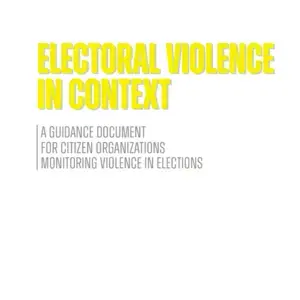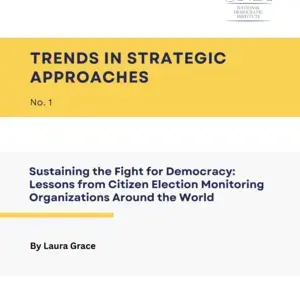TBILISI – Georgia approaches the October 8 parliamentary elections equipped with a deepening reserve of democratic assets while also facing critical but surmountable challenges, a preelection assessment mission of the National Democratic Institute (NDI) found.
NDI delegates said Georgians have many achievements to their credit, including a vibrant political landscape and overwhelming support for a democratic future for their country. At the same time, the country is on the front lines of a broader struggle to defend European and EuroAtlantic values from an aggressive and authoritarian worldview. Moreover, many of Georgians’ high and growing expectations of their leaders and institutions have not been fully met.
The underlying elements for a democratic election process are largely in place in Georgia,” NDI said.
“However, the country’s leaders will be called upon to exercise substantial political will and partisan restraint to turn that potential into reality.”
NDI noted that the integrity of the parliamentary elections will depend on overcoming three primary challenges: the possibility of violence and intimidation; low confidence that laws will be applied impartially; and the perception that some individuals will significantly influence the process from behind the scenes. In addition, the delegation identified concerns about some aspects of the electoral framework and administration, parties’ campaigns, and the overall campaign environment.
NDI offered a number of recommendations to government and electoral authorities, the parliament, political parties, and NGOs to contribute to improvements in these areas. These included a code of conduct among political parties; candidate debates; expeditious and consistent due process for violations of the law; development of an inclusive and transparent process for parliamentary parties to reach agreement on the electoral system and election code reform; recruitment and training of women candidates; and more rigorous reporting and investigation on campaign finances and donations.
“The election of a representative, accountable, and effective legislature with a strong mandate for reform is central to meeting Georgians’ hopes and aspirations,” said NDI. “Georgia’s leaders need to set an example by placing the integrity and peacefulness of the process above partisan interests; embracing forward-looking, issue-based policy agendas that respond to Georgians’ needs; and working across party lines when Georgia’s larger interests are at stake.”
The mission, which visited Georgia from June 13 to June 17, was made up of Sam Coppersmith, former member of the U.S. House of Representatives; Per Eklund, former EU ambassador to Georgia; Janusz Onyszkiewicz, former vice president of the European Parliament and Polish minister of defense; Michael Posner, professor at New York University Stern School of Business and former assistant secretary for democracy, human rights and labor at the U.S. State Department; Laura Jewett, NDI regional director for Eurasia; and Laura Thornton, NDI senior resident country director in Georgia. The delegation met with political parties from across the spectrum; electoral administrators; the President, Speaker of Parliament, Prime Minister, Foreign Minister, and representatives of other ministries; representatives of domestic and international observer groups; members of parliament; media representatives; and representatives of the international and diplomatic communities.
The NDI mission was funded by the U.S. Agency for International Development.
NDI is a nonprofit, nonpartisan organization working to support and strengthen democratic institutions worldwide through citizen participation, openness and accountability in government. The Institute has been working in the country since 1994 to support the development of the parliament, political parties and civil society.




